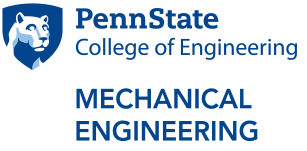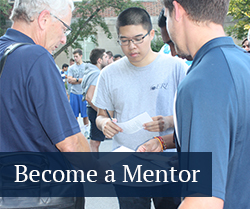Guidelines for Mentors
Welcome to the Penn State Mechanical Engineering Society Mentor Program!
The Penn State Mechanical Engineering Society mentor program facilitates a one‐to‐one relationship between a current student and a volunteer alumnus for guidance, information, and networking related to the student’s professional development.
The Role of a Mentor
Mentors serve many purposes. During the course of most mentor relationships, mentor roles are likely to include:
- Good listener
- Advocate
- Coach
- Friend
- Guide
- Positive role model
- Sponsor
- Facilitator of self‐esteem and self‐confidence
- Job Reference
Benchmarking information from other Penn State mentoring programs strongly suggests that personal contact between the mentor and the student is highly recommended to establish trust and enable open communication. Consequently, regular personal contact is desirable but if that is not possible, we recommend a face‐to‐face meeting early in the student/mentor relationship. However, if your relationship consists mostly of e‐mails, regular contact will go a long way toward establishing the kind of relationship in which the student’s potential is fostered.
Action Planning
Working together with your student on an action plan for the mentoring relationship is a great way to get started. It will help you to start getting acquainted while developing your goals and the basic steps you and your student can take together to achieve them. An action planning form is included in your Mentoring Handbook to help guide you through the process.
A Successful Mentor
- Listens intently to the student, and offers comment only when the student is receptive
- Is consistent
- Is a supporter but not a crutch
- Respects confidentiality (except in cases of potential harm to the student or other people)
- Has high, but realistic expectations
- Respects the student’s commitment by making good use of their time and by being prepared and on time for every meeting.
- Doesn’t expect or ask students to ‘return the favor’, by lining up football tickets or a place to stay in Happy Valley.
- Understands that he/she isn’t obligated to make commitments, but keeps all commitments made because the student is depending on it.
- Keeps the focus on career and professional development. If the student needs other kinds of assistance, directs them to the best place to get it.
The Five Tasks of a Mentor
- Establish a Positive Personal Relationship
- Most important task in mentoring
- Requires building trust
- Might take a while to cultivate, but be patient
- Is unique to each mentoring relationship
- Encourages regular interaction and specific support
- Should be enjoyable and fun
- Should enhance the student’s self‐esteem
- As in a professional sense, should be a good working relationship
- Help Develop Career Skills as Needed
- Goal setting
- Time management
- Communications
- Teamwork
- Critical thinking
- Decision making
- Perseverance, dedication, accountability
- The importance of continuing education
- Assist the Student in Obtaining Additional Resources
- Act as guide or advocate
- Discuss what resources and courses are needed to pursue and achieve goals and ambitions
- Act as an advisor, guide and advocate
- Be a resource and a network to help identify openings, as appropriate.
- Increase the Student’s Abilities to Interact with Other Social and Cultural Groups
- Broaden the student’s outlook on different kinds of social and business situations
- Respect differences; do not promote your values as superior
- Help the student understand the behaviors and attitudes needed to interact in the workplace and the larger society
- Challenge the student to think about the importance of respecting and functioning in a diverse world.
- Develop Competencies. Help the Student Develop by:
- Providing positive feedback on his or her work
- Share accomplishments and roadblocks you had to overcome in order to be successful
- Encourage him or her to seek new opportunities and experiences.
Remember
- This is about the student
You are agreeing to help your student with their career and professional development. Your shared objective should be to have the student achieve a successful start to a good career. Within that overall objective, what you do with your student, and how you do it, is up to the two of you to agree on. You should get the student to set the direction (it is their career!). If they ask for input, offer options, rather than a single direction. - A Mentor Listens
Mentors should encourage students to talk about their goals and concerns. Even when much of the relationship might be via email or phone, it is very important to understand clearly the student's point of view before commenting. However, as in conversation, the mentor should put aside impulses to direct the student in favor of encouraging a process of self-direction. - A Mentor Advocates
A mentor can help link students to resources they might not know exist or be able to otherwise access and utilize. Please take advantage of connections and associations you have on behalf of your student. - A Mentor Builds on the Positive
Whenever possible, approach the goals, issues and/or problems of your student in a positive light, building on related strengths that he or she has demonstrated. You can be the one to help your student see the connection between actions of today and dreams and goals of tomorrow. Be as concrete and relevant as possible. - A Mentor Encourages
Mentors can help build self-confidence and self-esteem to last a lifetime by focusing on the talents, assets, and strengths of the student. - A Mentor Turns Opportunities into a Learning Experience
Keep an eye out for learning opportunities and teachable moments. If your student expresses an interest in something, take advantage of the situation to help him or her develop the interest further. You may find that you develop a rewarding relationship with your student in the course of your work together, which continues beyond graduation. If so, great! But even if this does not develop, you can still get the satisfaction of helping a Penn State engineer get off to a great start in their career.



